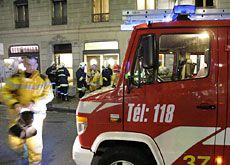Emergency call out for Swiss federalism?

New telephone information numbers in Switzerland are causing huge confusion, with many people calling the emergency services by mistake.
An attempt by the government to end the muddle by imposing a single number has met with opposition from some cantons. This latest battle of wills highlights a weakness of the country’s federal system.
In Switzerland the 26 cantons have a considerable amount of power – they can raise taxes and make their own laws, as long as they are in line with federal legislation. They also have their own governments and parliaments.
They normally work in tandem with the government, but sometimes the two can clash over which policy direction to take.
This is well illustrated by the disagreement over emergency numbers. Currently there are several emergency numbers in operation – 117 for the police, 118 for the fire service and 144 for ambulances. 112 is the central switchboard for all of them.
Only two cantons – St Gallen and Basel Country – run a centralised system through 112; in the rest of the country people can dial any of the four numbers. The present system has led to overload in some call centres.
Confusion
Added to this is the fact that the telephone directory inquiries number has changed and incorporates an 18. Some people are wrongly calling the fire brigade instead of directory enquiries.
An emergency meeting will be held later this month with the government aiming to persuade the fire service to move over to 112.
This latest move is part of the government’s ten-year battle to persuade cantons to only use 112. It wants to bring Switzerland into line with the rest of Europe, which uses only 112.
“It would be reasonable to introduce 112 into Switzerland too,” said Martin Dumermuth, head of the Federal Office of Communications.
But the cantons say the costs of a centralised system would be too high and point out that the number 144 (ambulances) benefits from having more specialised staff who give life-saving tips.
Tagging
Sometimes the disagreements are the other way around. This week it was announced that the government was stopping the electronic tagging of criminals, a scheme which was being trialled in seven Swiss cantons.
A recent report found that the system worked well, which was the view of most of the cantons taking part. But the government decided that tagging was not necessary, as a new criminal law stipulates that fines or community service should normally be imposed for short sentences.
Dominik Lehner, of the Basel Country prison and probation office, believes the government has got it wrong. “Electronic monitoring is much cheaper and more successful than prison for short sentences,” he told the Tages-Anzeiger newspaper.

More
Federalism
Essential
It may seem that Switzerland is getting bogged down in disagreements, but actually they are an essential part of Swiss federalism, says Thomas Fleiner of Fribourg University’s Institute of Federalism.
“You always have differences between the federal and cantonal governments – they may not agree but as long as this is during the preparation of legal issues and legislation this is normal,” he told swissinfo.
Most of the time the government and cantons work well, based on “committee and good understanding”, he said.
In the case of the emergency numbers, the government could enact a law, says Fleiner. The cantons on the other hand cannot force the government to fall into line with them. But the government has indicated that it will be consulting with the cantons further over electronic tagging.
Fleiner says Switzerland’s system works exactly because differences are ironed out early.
“The preparation of a law may take more time in Switzerland but once it is enforced, the quality of its enforcement and control of it is usually much better than in many other countries.”
swissinfo, Isobel Leybold-Johnson
Switzerland’s special brand of federalism keeps the country together, despite cultural, linguistic and religious differences.
One reason for this is direct democracy, which gives Swiss citizens the power to call for votes on any issue, another is the decentralisation of powers to the 26 cantons.
Swiss federalism is based on civil law. Federal states such as the United States and Canada are based on common law.
Federalism expert Thomas Fleiner says that under common law the executive may intervene via a court to enforce federal laws in federal units, a power that courts in Switzerland do not have.

In compliance with the JTI standards
More: SWI swissinfo.ch certified by the Journalism Trust Initiative














You can find an overview of ongoing debates with our journalists here . Please join us!
If you want to start a conversation about a topic raised in this article or want to report factual errors, email us at english@swissinfo.ch.